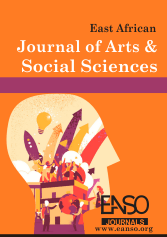Student-Centred Changemaker Portfolios: Evaluating TESCEA’s Impact on Critical Thinking, Gender Awareness, and Employability
Abstract
This study explores the effectiveness of student-centred changemaker portfolios implemented through the Transforming Employability for Social Change in East Africa (TESCEA) initiative at Gulu University. Anchored in transformative learning and gender mainstreaming frameworks, these portfolios aim to enhance students’ critical thinking, problem-solving, gender awareness, and employability in a post-conflict higher eduation context. Employing a qualitative-dominant approach complemented by quantitative surveys, the study examines students’ reflective experiences, faculty perspectives, and portfolio content. Findings indicate that portfolios foster reflective practice, gender-sensitive problem-solving, and employability skills while promoting agency and social responsibility. Challenges, including inconsistent faculty support, limited resources, and variable institutional commitment, constrain the full potential of the initiative. The study concludes that with strategic institutional support and continuous professional development, changemaker portfolios can serve as transformative pedagogical tools that bridge academic learning with socio-economic and gender equity objectives in fragile contexts.
Downloads
References
Adeyemi, T., & Yusuf, A. (2022). Democratizing education through reflective learning: Insights from African universities. Journal of African Higher Education, 18(2), 45–62.
Bamber, V., & Hankin, L. (2011). Developing reflective practice in higher education. Teaching in Higher Education, 16(1), 1–13. https://doi.org/10.1080/13562517.2011.537828
Braun, V., & Clarke, V. (2006). Using thematic analysis in psychology. Qualitative Research in Psychology, 3(2), 77–101. https://doi.org/10.1191/1478088706qp063oa
Brown, L., Smith, K., & Nguyen, P. (2021). Reflective portfolios and critical thinking: A meta-analytic review. Higher Education Research & Development, 40(7), 1452–1469. https://doi.org/10.1080/07294360.2021.1874893
Brennen, S., & Kreiss, D. (2014). Qualitative research methods. In The international encyclopedia of communication theory and philosophy (pp. 1–16). Wiley.
Creswell, J. W., & Creswell, J. D. (2018). Research design: Qualitative, quantitative, and mixed methods approaches (5th ed.). Sage.
Cranton, P. (2006). Understanding and promoting transformative learning: A guide for educators of adults (2nd ed.). Jossey-Bass.
Cranton, P., & King, K. (2003). Transformative learning as a professional development goal. New Directions for Adult and Continuing Education, 98, 31–38. https://doi.org/10.1002/ace.94
Evans, C., & Graham, C. (2022). Institutional readiness for pedagogical innovation: Lessons from African universities. Journal of Higher Education Policy and Management, 44(5), 499– 517. https://doi.org/10.1080/1360080X.2022.2058973
Israel, M. (2015). Research ethics and integrity for social scientists: Beyond regulatory compliance. Sage.
Jackson, L., & Mazzei, L. (2020). Portfolios as reflective tools in higher education: Integrating theory and practice. Studies in Higher Education, 45(8), 1645– 1660. https://doi.org/10.1080/03075079.2019.1571657
King, K., Cranton, P., & Taylor, E. (2005). Adult learning and post-conflict contexts. International Journal of Lifelong Education, 24(5), 403– 416. https://doi.org/10.1080/02601370500200149
Lincoln, Y. S., & Guba, E. G. (1985). Naturalistic inquiry. Sage.
Marshall, C., & Rossman, G. B. (2016). Designing qualitative research (6th ed.). Sage.
Mbabazi, P. (2023). Operationalizing gender mainstreaming in post-conflict educational settings. Journal of Education for Sustainable Development, 17(1), 89–102. https://doi.org/10.1177/09734082221134567
Mezirow, J. (1991). Transformative dimensions of adult learning. Jossey-Bass.
Mezirow, J. (1997). Transformative learning: Theory to practice. New Directions for Adult and Continuing Education, 74, 5–12. https://doi.org/10.1002/ace.7401
Mezirow, J. (2000). Learning as transformation: Critical perspectives on a theory in progress. Jossey-Bass.
Patton, M. Q. (2015). Qualitative research & evaluation methods (4th ed.). Sage.
Rubin, H. J., & Rubin, I. S. (2012). Qualitative interviewing: The art of hearing data (3rd ed.). Sage.
Shenton, A. K. (2004). Strategies for ensuring trustworthiness in qualitative research projects. Education for Information, 22(2), 63–75. https://doi.org/10.3233/EFI-2004-22201
Smith, J., & Lee, K. (2021). Reflective portfolios in higher education: Student motivation and learning outcomes. International Journal of Educational Research, 107, 101709. https://doi.org/10.1016/j.ijer.2021.101709
Taylor, E. W. (2017). Critical reflection and transformative learning in post-conflict education. Journal of Transformative Education, 15(3), 177–192. https://doi.org/10.1177/1541344617722016
UNESCO. (2022). Global report on higher education trends. United Nations Educational, Scientific and Cultural Organization.
Copyright (c) 2025 Gloria Lamaro, Beatrice Abonga Ajok, Ricky Richard Ojara, Elly Kurobuza Ndyomugyenyi, George Ladaah Openjuru

This work is licensed under a Creative Commons Attribution 4.0 International License.




























